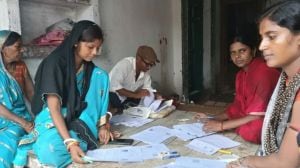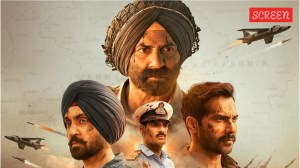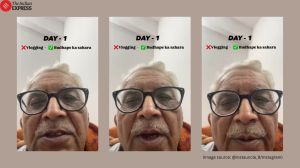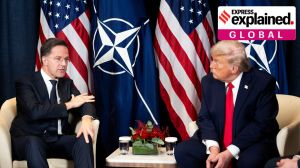Pilgrims to the US
The formal objective of the visit to the US of Prime Minister Atal Bihari Vajpayee and Pakistan8217;s President Musharraf was to participat...

The formal objective of the visit to the US of Prime Minister Atal Bihari Vajpayee and Pakistan8217;s President Musharraf was to participate in the UN General Assembly session and to join the commemorative ceremony in New York on the first anniversary of the September 11 attacks. The substantive aim of both leaders was to utilise the opportunity to have a detailed discussion with US President Bush so as to make American policies more responsive towards the interests of Pakistan and India respectively.
Musharraf and Vajpayee went to New York in the background of critical domestic developments in their respective countries. Vajpayee is coping with the inner contradictions of his coalition government and within the BJP itself. Elections in Gujarat and in Jammu 038; Kashmir have generated a tense chemistry in Indian politics. There has been no let up in subversive terrorist activity originating in Pakistan. The policy orientation towards the liberalisation of the economy in India is subject to short-term political and ideological pressures.
Musharraf is facing widespread criticism from all political parties at home regarding the manner in which he has amended the Pakistani Constitution and the procedural and legal requirements he has put in place for participation in the elections in October. The US is less than satisfied not only with his performance in curbing terrorism but also because north-western areas of Pakistan have re-emerged as centres of activity by Taliban and Al-Qaeda.
Musharraf8217;s wish-list during his visit to the US read as follows: he desired support from the US for the political dispensation he is structuring for Pakistan and the restoration of defence supplies and weaponry to Pakistan; an augmentation of financial and technological inputs into Pakistan8217;s economy; US understanding of, if not support for, his Kashmir policies. He remains keen on direct US political and diplomatic intervention in the Kashmir issue to pressurise India into a compromise acceptable to Pakistan. He must have made an effort to explain to President Bush the rationale of his 8216;public stance8217; of opposing the intended US military operations against Iraq. Broadly speaking, except on restoration of defence supplies, Musharraf received a positive response to his other advocacies.
Vajpayee8217;s first priority was to convey India8217;s concerns about the continuing challenge to India8217;s unity and territorial integrity by Pakistan. He aimed to convey to the US that Musharraf has not adhered to his assurances given in his statements of June 12 and May 27. Some agreements were reached for enhancing technological cooperation in the sphere of peaceful uses of space and nuclear energy. Reportedly, National Security Advisor Brajesh Mishra did underline Indian disappointment with the US response on the question of Pakistan-sponsored terrorism. There was no signal that the US was in a position to do more than what it has done so far, barring the re-articulation of some general assurances.
What, then, could be the general assessment of the impact of these exchanges between Vajpayee and Musharraf on the one hand and Bush on the other? From available information, the public expectations from these discussions have been sadly unfulfilled.
|
One has not seen any new initiative or additional assurances coming from the US about holding Musharraf responsible for subversive terrorism engineered by Pakistan |
Musharraf8217;s policy statement at the UNGA and his pronouncements in other fora clearly indicate that his intensely adversarial policy towards India remains unchanged. He remains mendacious by asserting that no cross border intrusions or terrorist activities are taking place in J038;K from Pakistan8217;s side of the Line of Control. Secondly, he has affirmed without any inhibition that he will raise the Kashmir issue in every manner, on every occasion available to him. His objective of subverting the unity and territorial integrity of India remains unchanged. The government and the people of India should consider the response to be given to his offers for dialogue in this context regardless of advice coming from other quarters.
While Vajpayee reportedly had a useful exchange with Bush on September 12, one has not seen any new initiative or additional assurances coming from the US about holding Musharraf responsible for subversive terrorism engineered by Pakistan against India. Nor has there been any categorical affirmation that it will question Pakistan8217;s attempts at disrupting elections in J038;K.
Unfortunately, Vajpayee8217;s statement in the UNGA became a debating exercise rather than an assertive articulation of policy decisions and Indian intentions in response to Musharraf8217;s clear indications that he will continue his anti-India policies. Questioning the points made by Musharraf against India or countering them with satire is not enough. The UNGA was an occasion to convey a clear message to the international community that India8217;s responses will now go beyond policy statements.
According to reports, Bush told Vajpayee that he intends to exert more pressure on Pakistan to fall in line with the international anti-terrorist campaign, particularly in relation to India. This has been conveyed to India by the US over the last six months. The question is whether Bush mentioned the specifics about the pressure he intends to generate on Musharraf.
There have been reports of Bush and Vajpayee agreeing on expanding defence and technological cooperation. It is pertinent for the people of India to know whether this expanded cooperation is going to be substantive or cosmetic. It is also necessary that the Indian people know what its conditions and terms of reference are.
Another important issue discussed by Vajpayee at the UN is the reported US plan to launch military operations against Iraq. One hopes that the Government of India has conveyed its firm opposition to any unilateral action by the US. That the Government of India plans to be more active on this issue is indicated by the reported discussions between External Affairs Minister Yashwant Sinha with his Russian and Chinese counterparts.
Military operations will only increase the suffering of the common people of Iraq. Any action in Iraq should be based on a consensus in the United Nations Security Council and the General Assembly.
- 01
- 02
- 03
- 04
- 05






























